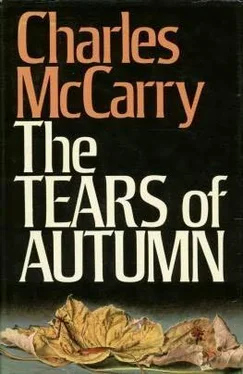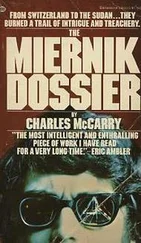Over the urinal, Luong had written 1230 Airborne. Christopher spat on his thumb and wiped out the message; the blue ballpoint ink stained the ridges of his thumbprint, and he went back to the bar and scrubbed it off with beer and his handkerchief.
Honey put her hands on the bar beside him and said, “You coming home tonight?”
Christopher, watching the sergeant in the mirror, said, “Yes, but very late. Don’t let the sergeant fall asleep.”
Honey’s face, like that of a bride in a photographer’s shop window, was fixed in innocence.
Luong took Christopher’s arm and led him through his darkened house to the bedroom. A picture of Christ, vermilion heart glowing through a white winding sheet, hung over the bed. Christopher had seen the original in Saint Peter’s.
“It’s not good to meet here,” Luong said. “My wife wonders who you are.”
“You can’t go out at night.”
“I can. But carefully. I have something about this name, Lê Thu.”
Christopher was tired; he moved so that his back was against the head of the bed.
“I haven’t put a person to the name yet,” Luong said, “but there is something about it-it startled some of the people I asked.”
“Startled them? Why?”
“I think perhaps there is no person, that this is a false name -but I suppose you expected that. U, as you know, comes from the old Chinese. It means, or suggests, ‘tears.’ Thu means ‘autumn’ in Vietnamese-therefore, ‘the tears of autumn.’”
Christopher nodded. “As Lê Xuan-Madame Nhu’s name -means the tears of spring.”
“Exactly. I asked a man who takes messages into the countryside if he had ever heard the name. His reaction was interesting. He said nothing, as if he were thinking, and then something connected in his memory. He advised me to forget the name, and left me.”
“Did you go on asking after that?”
“No. I had already asked others. There is a man I might see, but he’s not in Saigon. He’s in a village on the way to Bien Hoa. I had no reason to go today, but perhaps tomorrow I can drive there. We have a party cell in the village-he has not been unfriendly.”
“Who is he?”
“He was a Catholic priest when the French were here. They thought he was running with the Viet Minh and they tortured him. They say he’s a eunuch. He still lives in the church and wears priest’s clothes.”
“Does he still run with the Communists?”
Luong shrugged. “Who knows? He’s a remote connection of the Ngos-his grandfather married one of their women while the Catholics were still in the North.”
“Would he talk to me?”
“Not for money. Maybe for curiosity. There’s talk about you -you went to see the Truong toe, I hear. They’ve been asking about a man who must be you. They think you’re French, despite your looks.”
“They haven’t tried to contact me,” Christopher said.
“They can’t find you in any of the places you should be.”
“And if I talk to this priest?”
“Then they’ll find you.”
“He reports to them?”
“He’s their relative, my friend. You’re a foreigner,” Luong said. “There’s a way to deal with him, Crawford. He’s doing some business with opium-a lot more of the stuff has been moving in the last few weeks, I hear.”
“Moving? How?”
“The VC are bringing it in from Cambodia, and from Laos, down the trail. I hear that the principal storage place is under the priest’s church-there are VC tunnels running under the village. They control that part of the countryside.”
“Then he is still running with the Communists?”
“Doing business with them. He’s buying. He has a great deal of money, it’s said, very suddenly. He never had any before.”
“How would one deal with him? Offer to buy? Threaten to expose him?”
“I wouldn’t make threats,” Luong said.
“Show me where he can be found, exactly.”
Luong drew a map on a page of Christopher’s notebook, showing the roads to the village. He drew a row ofX’s along the main line. “Ambushes at all these places recently,” he said. On another page he sketched the village, showing the church and the room where the priest lived. Christopher studied the pages for a moment, then ripped them out of the notebook and handed them back to Luong. “What’s his name?” he asked.
“With whites he uses the French style,” Luong said. “Jean-Baptiste Ho.”
Christopher stood up. Fatigue ran through his body like a painful injection. “Where can I get a car without papers?”
“Now? You’re going out there at night?”
“Yes. I can get back before daylight.”
Luong gave him the name of a garage. “There’s one more person I can ask tonight about the name,” he said. “I don’t want to meet here again-have you a place in the city?”
Christopher, so as not to say it aloud, wrote the address of Honey’s room and sketched the entrance. He looked at his watch. “I’ll be back at five o’clock in the morning,” he said. “Don’t come after it’s light.”
“If I have anything by five o’clock, I’ll come,” Luong said.
Christopher shook hands with him. “One more thing-if Lê Thu means the tears of autumn as a name, how do you say it in the ordinary way?
“In Vietnamese? Nu ό e mằt mùa thu.”
“It’s more poetic in French.”
Luong smiled. “You hear music in the language you know,” he said.
The car was a Citroen with only thirty thousand kilometers on the odometer. Its soft fabric cushions and the air suspension took some of the ache out of Christopher’s back and legs. There was a checkpoint at the Thi Nghe Canal bridge where the highway joined the avenue leading into Saigon; a young guard took the thousand-piaster note clipped to Christopher’s press card and waved him through.
The Citroen made very little noise apart from the grip of its tires on the tar road. Christopher turned off the headlights, and by the time he was far enough away from Saigon to be in danger, he saw well enough in the starlight to drive as fast as the car would go. His eye followed the road through the trees and the low bushes, and the paddies shining in the darkness like coins. He saw no movement. He didn’t think that anyone would expect to see a darkened car moving at 150 kilometers an hour, or be able to hit it with gunfire.
On the dirt track leading into the village, Christopher went more slowly, but still dust blew in the open windows and coated the interior of the car. The church was a small building standing by itself beyond the huts that lined the principal street. Light from the altar candles leaked through its thin walls. Inside, there were a few long benches with their ends lying in deep shadow. Like Patchen’s house in Washington, the church was a place in which nothing involving human emotion had happened in a long time.
Christopher knocked, loudly, on the door behind the altar. The priest opened the door at once; behind him, the tiny room in which he lived was lit by a kerosine lantern. He wore a cassock, unbuttoned at the top so that his neck and his bony chest showed. Christopher heard a soft noise and saw a woman sitting upright on a plank bed; she turned her eyes aside and went to stand with her back against the wall at the far side of the room.
“I’m sorry to disturb you, Father,” Christopher said. “I need your help.”
The little priest threw back his head and looked Christopher in the eye. “It’s very late,” he said. “It’s very dangerous, there are no army patrols at this time of night.”
“So I understand, but it was important that I see you. You are Jean-Baptiste Ho?”
Читать дальше












